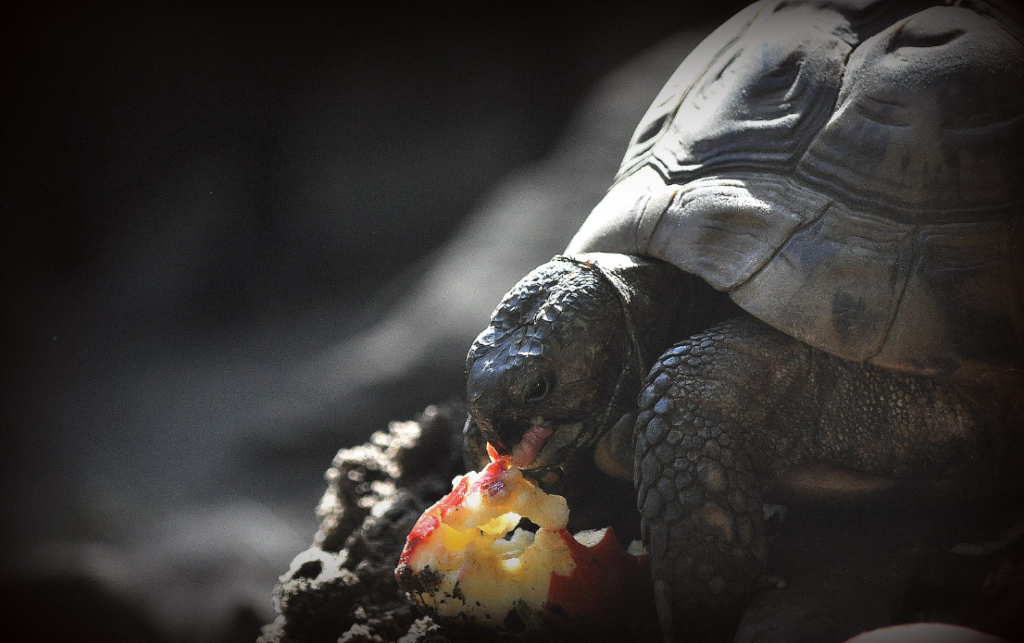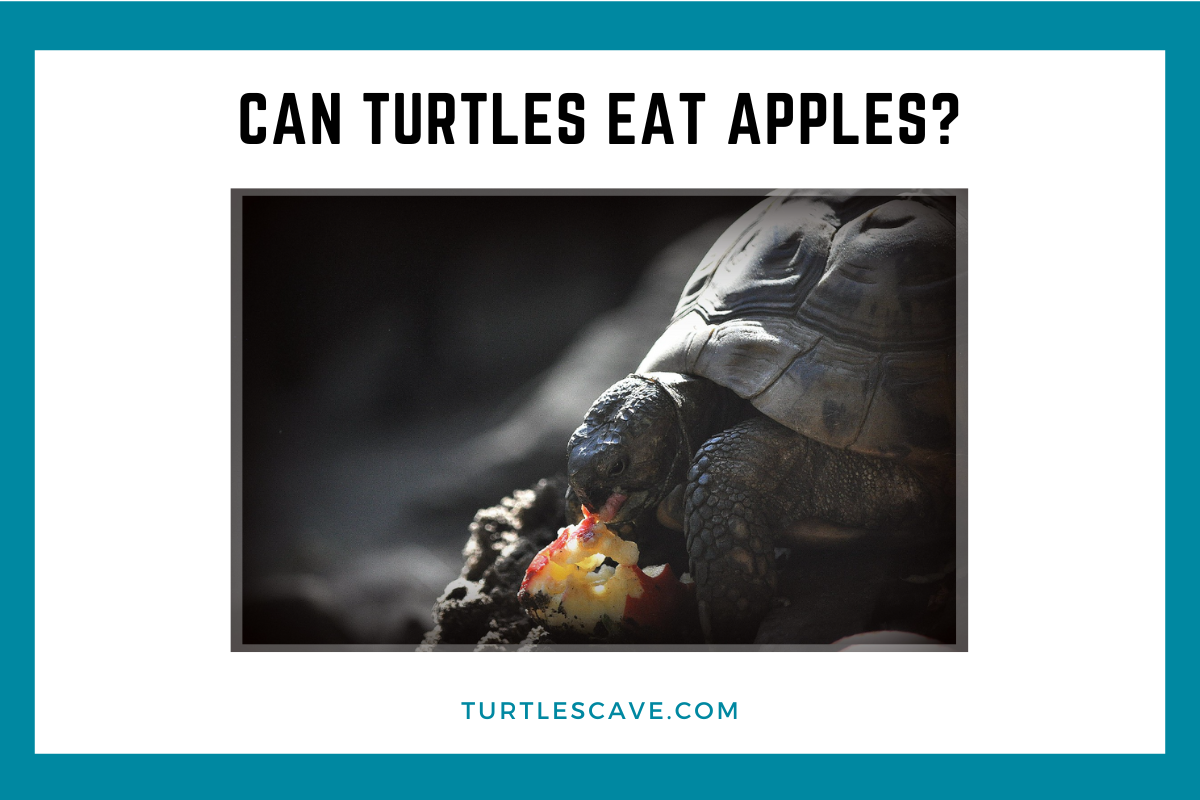Yes, turtles can eat apples, but it should be given sparingly as a treat due to their high sugar content. Turtles are omnivorous reptiles that can consume a variety of fruits and vegetables, including apples, as part of their diet.
Can Turtles Eat Apples? A Surprising Guide to Their Dietary Habits” Let’s embark on a fruity adventure as we unravel the mysteries of turtles and their love affair with apples. Curious whether these shelled creatures indulge in the crisp sweetness of this beloved fruit? The short answer is Yes. But hold onto your stems because we’re about to peel back the layers of their dietary habits and discover some surprising revelations. Get ready for a tantalizing taste of turtle trivia!

Understanding The Natural Diet Of Turtles
Turtles are fascinating creatures with diverse dietary preferences. Understanding their natural diet is crucial for their overall health and well-being. Let’s delve into the different types of turtles and their specific dietary requirements.
Herbivorous Turtles
Herbivorous turtles, as the name suggests, primarily consume plant-based foods. Here are a few key points about herbivorous turtles:
- Herbivorous turtles are equipped with specialized beaks and jaws to munch on vegetation.
- These turtles prefer a diet rich in leafy greens, fruits, and vegetables.
- Some herbivorous turtle species include the red-eared slider, painted turtle, and the greek tortoise.
Types Of Herbivorous Turtles
- Red-eared slider: Known for their vibrant red markings, red-eared sliders are commonly found in freshwater habitats. They enjoy feasting on various aquatic plants, such as duckweed and water lettuce.
- Painted turtle: Painted turtles are native to north america and have a penchant for aquatic vegetation like algae, water lilies, and duckweed. They also consume certain land plants, including berries and grasses.
- Greek tortoise: These terrestrial turtles mainly dwell in dry grasslands and mediterranean environments. Their diet comprises a variety of plants like dandelion greens, hibiscus leaves, and even some fruits.
Common Food Sources For Herbivorous Turtles
- Leafy greens: Herbivorous turtles relish greens like romaine lettuce, kale, and collard greens. These provide essential nutrients and fiber.
- Fruits and vegetables: These turtles savor fruits such as apples, strawberries, and melons, along with vegetables like carrots, sweet potatoes, and cucumbers.
- Aquatic plants: Some herbivorous turtles consume aquatic plants such as water lettuce, duckweed, and water hyacinth.
Omnivorous Turtles
Unlike herbivorous turtles, omnivorous turtles have a more diverse diet that includes both plant and animal matter. Let’s explore some key points about omnivorous turtles:
- Omnivorous turtles have a varied diet to meet their nutritional needs.
- They possess a mixed dentition, with both sharp and flat teeth, allowing them to consume a wide range of foods.
- Common omnivorous turtle species include the eastern box turtle, map turtle, and the yellow-bellied slider.
Types Of Omnivorous Turtles
- Eastern box turtle: These land-dwelling turtles have a versatile palate, feasting on fruits, berries, mushrooms, insects, earthworms, and even small vertebrates.
- Map turtle: Map turtles inhabit rivers and prefer a mix of plant materials like aquatic vegetation, algae, and fruits. They also supplement their diet with aquatic invertebrates.
- Yellow-bellied slider: Yellow-bellied sliders have a broad diet, comprising aquatic plants, vegetation, insects, small fish, and tadpoles.
A Look Into Omnivorous Turtle Diets
- Insects and invertebrates: Omnivorous turtles often consume insects like crickets, mealworms, and earthworms. These serve as an excellent source of protein.
- Fruits and vegetables: They enjoy a variety of fruits, including berries, figs, and bananas. Vegetables like squash, peas, and green beans also contribute to their well-rounded diet.
- Aquatic prey: Some omnivorous turtles hunt for small fish, tadpoles, and snails in their water habitats.
Carnivorous Turtles
Carnivorous turtles have a diet mainly consisting of animal matter. Let’s take a closer look at these fascinating creatures:
- Carnivorous turtles have sharp beaks and strong bite force to capture and consume their prey.
- They often display scavenging behavior, opportunistically feeding on both live and dead animals.
- Some carnivorous turtle species include the snapping turtle, alligator snapping turtle, and the mata mata turtle.
Types Of Carnivorous Turtles
- Snapping turtle: Known for their aggressive nature, snapping turtles are voracious hunters. They prey on various animals such as fish, frogs, small reptiles, birds, and even mammals.
- Alligator snapping turtle: The alligator snapping turtle is one of the largest freshwater turtles, with a diet consisting of fish, amphibians, snakes, and even small turtles. They attract prey using a worm-like lure on their tongue.
- Mata mata turtle: These unique turtles rely on camouflage to ambush prey. Their diet consists of aquatic invertebrates, small fish, and frogs.
Key Components Of Carnivorous Turtle Diets
- Fish and aquatic creatures: Carnivorous turtles primarily feed on fish, snails, frogs, and small invertebrates present in their aquatic habitats.
- Amphibians and reptiles: They also consume amphibians such as frogs and reptiles like lizards, snakes, and even smaller turtle species.
- Carrion: Carnivorous turtles scavenge for dead animals, making them efficient in maintaining the balance of their ecosystem.
Understanding the natural diet of turtles is crucial for their overall health and happiness. Providing them with appropriate foods that mimic their natural diets will contribute to their longevity and well-being.
Exploring The Nutritional Needs Of Turtles
Turtles, like any other living beings, have specific nutritional requirements to stay healthy and thrive. Providing them with a well-balanced diet lays the foundation for their overall well-being. When it comes to turtles, there are several important nutrients that deserve our attention.
These include calcium, vitamin d, protein, and fiber. Let’s take a closer look at each of these in detail:
Important Nutrients For Turtles
Here are the key points regarding the essential nutrients for turtles:
- Calcium: Calcium plays a vital role in maintaining turtles’ shell health and overall growth. Providing a sufficient amount of calcium ensures strong bones and a sturdy shell. A calcium-deficient diet can lead to various health problems in turtles, such as metabolic bone disease.
- Vitamin d: Turtles need vitamin d to properly absorb calcium from their diet. Exposure to ultraviolet (uv) light, either from sunlight or artificial uvb lamps, enables turtles to produce vitamin d3 in their bodies. This vitamin helps regulate their calcium levels and contributes to the development of a strong shell.
- Protein: Protein is an important component of a turtle’s diet as it supports muscle development, growth, and overall energy levels. Including protein-rich foods such as insects, fish, and small amounts of lean meats in their diet helps meet their protein requirements.
- Fiber: Fiber is essential for maintaining a healthy digestive system in turtles. It aids in proper digestion and helps prevent issues like constipation. Adding fibrous foods like leafy greens and vegetables to their diet can contribute to a healthy digestive tract.
How Apples Fit Into The Nutritional Profile Of Turtles
Now, let’s talk about where apples fit into a turtle’s nutritional profile:
- Apples are a good source of several vitamins, including vitamins a and c. these vitamins are beneficial for a turtle’s overall health and immune system.
- They also contain some dietary fiber, which promotes healthy digestion in turtles.
- However, apples are relatively high in sugar content compared to other fruits. Therefore, they should be considered a treat rather than a staple part of a turtle’s diet.
Apples As A Treat For Turtles – Moderation Is Key
When offering apples to your turtle, remember to do so in moderation:
- Apples can be given as an occasional treat, rather than a daily food source. Offering small pieces of apple once or twice a week can be a delightful addition to their diet.
- It’s important to remove the seeds and core, as they can be a choking hazard for turtles.
- Always ensure that the apple pieces you provide are fresh and pesticide-free.
Remember that a balanced and varied diet is crucial for maintaining a turtle’s optimal health. Apples can be a part of that varied diet and serve as a tasty treat, but it’s important to prioritize foods that meet the essential nutritional requirements outlined above.
When it comes to feeding your turtle, consulting with a reptile veterinarian or an expert in turtle care can provide valuable guidance tailored to your specific turtle’s needs. Putting in the effort to understand and meet your turtle’s nutritional needs will undoubtedly contribute to their long and healthy life.
Can Turtles Safely Consume Apples?
When it comes to turtles’ diet, it’s essential to consider the potential risks and benefits of introducing new foods. Apples are a commonly consumed fruit, and if you’re wondering whether turtles can safely eat them, this section will provide you with some key factors to consider.
Factors To Consider
Size of the turtle:
- Small turtles may struggle to consume apples due to their size and the hardness of the fruit.
- Larger turtles can more easily eat and digest apples.
Age of the turtle:
- Young turtles may have more sensitive digestive systems and may struggle with new foods like apples.
- Adult turtles generally have stronger digestive abilities and may tolerate apples better.
Health condition of the turtle:
- Turtles with pre-existing health conditions may require a specialized diet and might not be able to handle apples.
- Healthy turtles without any known health issues may be able to safely consume apples in moderation.
Potential Risks Of Feeding Apples To Turtles
Digestive issues:
- Turtles have delicate digestive systems, and introducing new foods can sometimes lead to digestive problems.
- Some turtles may experience diarrhea or constipation when consuming apples.
Imbalance in nutritional intake:
- Turtles require a balanced diet to meet their nutritional needs.
- Apples, while rich in fiber and vitamin c, should not replace essential components of their diet, such as leafy greens or proteins.
Dental problems:
- Turtles may have varied dental health, and the firm texture of apples can be challenging for them to chew.
- Hard foods like apples may cause dental issues in turtles with weak or damaged teeth.
Moderation and balance when introducing apples into the turtle’s diet:
- Introduce apples gradually and in small quantities to monitor your turtle’s reaction.
- Always ensure that apples are sliced into small, manageable pieces to prevent choking hazards.
- Remember to maintain a balanced and varied diet for your turtle, incorporating other suitable foods alongside apples.
By carefully considering the size, age, and health condition of your turtle, as well as being aware of the potential risks and the importance of moderation and balance, you can make an informed decision about feeding apples to turtles. Always consult with a veterinarian or reptile expert to ensure the best diet for your specific turtle species.
Alternative Fruits And Vegetables Suitable For Turtles
Turtles require a well-rounded diet to ensure their optimal health and well-being. While apples may not be an ideal choice for turtles due to their high sugar content, there are plenty of alternative fruits and vegetables that are suitable for your shelled friend.
By incorporating a variety of these options into their diet, you can provide your turtle with the essential nutrients they need to thrive.
Best Fruits For Turtles
Including fruits in your turtle’s diet can provide them with essential vitamins and minerals. Here are some of the best fruits you can offer your turtle:
- Strawberries: Rich in vitamin c and antioxidants, strawberries can be a delightful treat for your turtle.
- Blueberries: Packed with antioxidants, blueberries are not only tasty but also beneficial for your turtle’s overall health.
- Papaya: High in vitamin a and fiber, papaya can help promote a healthy digestive system in turtles.
- Watermelon: A hydrating fruit, watermelon is a great choice for turtles, especially during the hot summer months.
Nutritional Content And Benefits
Fruits offer a wide range of nutritional benefits for turtles. Some key points include:
- Vitamin c helps support the immune system and promotes wound healing.
- Antioxidants in fruits can help reduce inflammation and protect against cell damage.
- Fiber aids in maintaining a healthy digestive system.
- Essential vitamins and minerals contribute to overall turtle health and vitality.
Recommended Vegetables For Turtles
Alongside fruits, vegetables play a crucial role in a turtle’s diet. Consider offering the following vegetables to your turtle:
- Leafy greens: Kale, collard greens, and dandelion greens are excellent choices, packed with essential vitamins and minerals.
- Carrots: These crunchy vegetables are a good source of vitamin a, promoting healthy eyesight in turtles.
- Bell peppers: Rich in vitamin c, bell peppers add a vibrant splash of color to your turtle’s diet while supporting their immune system.
- Squash: Varieties such as butternut and acorn squash are nutrient-dense choices that provide essential vitamins and fiber.
Nutritional Content And Benefits
Including vegetables in your turtle’s diet offers the following benefits:
- Leafy greens are rich in calcium, which is vital for maintaining a healthy shell and bones.
- Vitamin a helps support vision health and promotes proper growth and development.
- Bell peppers and squash provide essential vitamins and antioxidants, promoting overall well-being in turtles.
Providing A Varied Diet For Optimal Turtle Health
To ensure your turtle’s optimal health, it is essential to provide a varied and balanced diet. Incorporating a mix of fruits and vegetables allows your turtle to obtain a wide range of nutrients. Remember to feed in moderation and always wash fruits and vegetables thoroughly before serving.
By offering a diverse array of food options, you can support your turtle’s overall health and happiness.
So, while turtles may not be able to enjoy apples, there is a whole world of alternative fruits and vegetables out there for them to explore!
Frequently Asked Questions On Can Turtles Eat Apples?
Can Turtles Eat Apples?
Turtles can eat apples, but they should only be given in moderation and as a treat. Apples are high in sugar, so excessive consumption can lead to obesity and other health issues. It’s important to provide a balanced and varied diet, including other vegetables and leafy greens, to keep your turtle healthy.
Are Apples Good For Turtles?
Apples can be a nutritious addition to a turtle’s diet when given in moderation. They provide vitamins, minerals, and antioxidants. However, due to their high sugar content, it’s important not to overfeed apples to turtles, as it can lead to obesity and other health problems.
Always consult with a veterinarian for specific dietary recommendations.
Can Turtles Eat Apple Seeds?
It’s best to remove apple seeds before feeding them to turtles. Apple seeds contain a compound called amygdalin, which can release cyanide when ingested in large quantities. While a few seeds are unlikely to cause harm, it’s safer to remove them to ensure the turtle’s wellbeing.
What Other Fruits Can Turtles Eat?
Turtles can enjoy a variety of fruits as part of their diet. Some safe options include strawberries, blueberries, bananas, and melons. Always remove any seeds, pits, or rinds and feed fruits in moderation, as they are high in sugar. Remember that fruits should be a supplement to a turtle’s primary diet of vegetables and protein.
Should Turtles Eat Apples Every Day?
No, turtles should not eat apples every day. While apples can be a healthy addition to their diet, they should only be given occasionally and in moderation. Too much sugar from apples or any other fruit can lead to obesity, digestive issues, and imbalances in their diet.
A balanced and varied diet is crucial for a turtle’s overall health.
Conclusion
It is safe for turtles to eat apples as a part of their diet, however, they should be given in moderation. Apples provide essential nutrients and hydration to turtles, but their high sugar content can lead to various health issues if consumed excessively.
When offering apples to your turtle, make sure to remove the seeds and core, as they can be toxic. It is also important to provide a balanced diet that includes a variety of foods such as leafy greens, vegetables, and proteins.
Recent Posts
Turtles headbutt black things due to their instinctual response to threats or territorial disputes. When turtles encounter black objects, they may perceive them as intruders or competitors, leading...
To fix a hole in a turtle shell, clean the wound thoroughly and apply adhesive or a patch specifically designed for shell repairs. Then monitor the turtle for any signs of infection or further...

